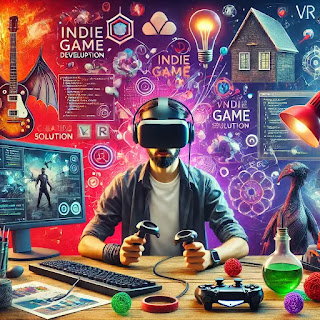The video game industry has always been at the forefront of technological
innovation, and the advent of Virtual Reality (VR) is no exception. While
major video game studios have made significant strides in VR development,
indie developers are also emerging as key innovators in this space. These
smaller teams often bring fresh perspectives and experimental approaches,
pushing the boundaries of what VR can offer. In this article, we'll explore how
indie developers are leveraging VR solutions to create unique and immersive
video game experiences.
Embracing Experimental Gameplay
One of the most exciting aspects of indie game development is the willingness
to experiment. Indie developers often have the creative freedom to explore
unconventional ideas without the pressure of meeting high commercial
expectations. This experimental mindset is particularly evident in VR game
VR Solutions for Unique Interaction Mechanisms: Indie developers are using
VR to rethink traditional game mechanics. For instance, games like "Job Simulator"
by Owlchemy Labs offer players a highly interactive environment where they can
manipulate objects in ways not possible with conventional controllers. This level
of interaction provides a deeply immersive experience, showcasing the potential
of VR solutions to transform gameplay.
Creating Immersive Storytelling
Storytelling in video games is being redefined by VR technology. Indie developers
are using VR to create narrative experiences that engage players on a more
personal and emotional level.
Immersive Narratives with VR: Games like "The Under Presents" by Tender Claws
blend VR with live theater elements, allowing players to interact with live actors in
a virtual space. This innovative use of VR solutions creates a unique storytelling
medium that blurs the line between gaming and performance art.
Pioneering New Genres
Indie developers are often at the forefront of genre innovation, and VR has provided
a fertile ground for creating entirely new types of games.
New VR Game Genres: Games like "Beat Saber" by Beat Games have
pioneered the rhythm game genre in VR, combining music with physical
movement in a way that feels fresh and exhilarating. These new genres are
attracting players who may not have been interested in traditional video
games, expanding the audience for VR experiences.
Fostering Community and Collaboration
The indie game development community is known for its collaborative spirit,
and this extends to the development of VR games. Many indie developers
share their knowledge and tools, fostering a culture of innovation and mutual support.
Collaborative VR Development: Platforms like itch.io and Steam's Early
Access program allow indie developers to release early versions of their
games and receive feedback from the community. This iterative process
helps developers refine their VR solutions and create better, more polished games.
Overcoming Challenges with Creativity
Indie developers often face resource constraints, but these limitations can
lead to creative problem-solving and innovative solutions.
Resourceful Use of VR Technology: Indie developers are finding ways to
maximize the potential of VR without the need for extensive budgets. For
example, "A Fisherman's Tale" by Innerspace VR uses clever puzzle design
and storytelling to create a memorable experience, demonstrating that innovation
can thrive even with limited resources.
Expanding Accessibility
Accessibility is a crucial consideration in modern game development, and indie
developers are using VR solutions to make games more inclusive.
Accessible VR Experiences: Developers like Happy Giant, creators of "Sam &
Max: This Time It’s Virtual!", are incorporating accessibility features such as
adjustable movement controls and customizable settings to ensure a wider range
of players can enjoy their games.
Conclusion
Indie developers are playing a pivotal role in the evolution of VR in the gaming
industry. By embracing experimental gameplay, creating immersive storytelling
experiences, pioneering new genres, fostering community collaboration,
overcoming challenges with creativity, and expanding accessibility, indie
developers are demonstrating the transformative potential of VR solutions.
As these innovative video game studios continue to push the boundaries, we
can expect even more groundbreaking VR experiences that captivate and
engage players in unprecedented ways.
The future of VR in gaming is bright, and indie developers are at the heart of
this exciting journey, proving that with creativity and passion, even small teams
can make a significant impact on the industry.

.jpg)

.jpg)
No comments:
Post a Comment